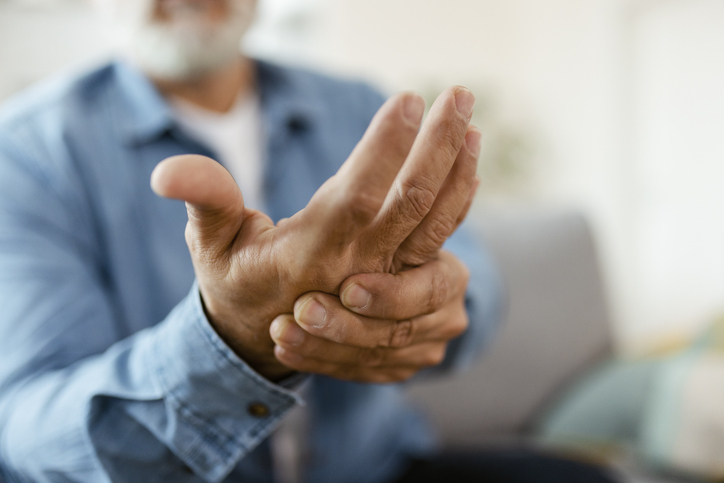Rheumatoid and Other Inflammatory Arthritis
Rheumatoid and Other Inflammatory Arthritis
Rheumatoid and Other Inflammatory Arthritis
Rheumatoid arthritis (RA) and other types of inflammatory arthritis cause pain and stiffness in your joints. They’re inflammatory autoimmune diseases, and also affect other parts of your body.
Doctors who diagnose and treat autoimmune and inflammatory diseases, like RA, are rheumatologists. They’re experts in these conditions and the types of medicines that treat them.
If you have joint pain and swelling, a Carilion Clinic rheumatologist can help you get an accurate diagnosis. They’ll help you find the right medicine to stop your arthritis from getting worse.
Rheumatoid arthritis (RA) and other types of inflammatory arthritis cause pain and stiffness in your joints. They’re inflammatory autoimmune diseases, and also affect other parts of your body.
Doctors who diagnose and treat autoimmune and inflammatory diseases, like RA, are rheumatologists. They’re experts in these conditions and the types of medicines that treat them.
If you have joint pain and swelling, a Carilion Clinic rheumatologist can help you get an accurate diagnosis. They’ll help you find the right medicine to stop your arthritis from getting worse.
Doctors use the term inflammatory arthritis for conditions where your immune system attacks your joints. They can cause joint swelling, stiffness and pain. Doctors group these conditions by how the immune system behaves and what parts of the body they affect.
Autoimmune arthritis
These types happen when the immune system makes antibodies that attack healthy tissue. They often affect small joints and can involve organs as well:
- Rheumatoid arthritis (RA): The most common type. It often starts in the small joints of your hands and feet and can affect both sides of the body.
- Juvenile idiopathic arthritis: A type that begins in children and teens. Symptoms and severity vary from child to child.
Spondyloarthritis
This group is also immune-driven, but it usually doesn’t involve antibodies attacking the joints. These often affect the spine, hips and areas where tendons attach to bone:
- Psoriatic arthritis: Linked to psoriasis, a skin condition that causes scaly patches. It can affect joints, skin and nails.
- Ankylosing spondylitis: Often starts with pain and stiffness in the lower back. It can cause the bones of the spine to fuse over time.
- Reactive arthritis: Develops after an infection in the gut or urinary tract. Symptoms can include joint pain, eye irritation and skin problems.
- Enteropathic arthritis: Linked to inflammatory bowel diseases like Crohn’s disease or ulcerative colitis.
Crystal-related arthritis
These types occur when crystals build up inside joints and trigger inflammation. The immune system doesn’t drive them in the same way, but the result is still painful swelling and stiffness:
- Gout: Caused by uric acid crystals. It often starts in the big toe and can flare suddenly.
- Pseudogout: Caused by calcium crystals, most often in the knees or wrists.
Types of Inflammatory Arthritis
Doctors use the term inflammatory arthritis for conditions where your immune system attacks your joints. They can cause joint swelling, stiffness and pain. Doctors group these conditions by how the immune system behaves and what parts of the body they affect.
Autoimmune arthritis
These types happen when the immune system makes antibodies that attack healthy tissue. They often affect small joints and can involve organs as well:
- Rheumatoid arthritis (RA): The most common type. It often starts in the small joints of your hands and feet and can affect both sides of the body.
- Juvenile idiopathic arthritis: A type that begins in children and teens. Symptoms and severity vary from child to child.
Spondyloarthritis
This group is also immune-driven, but it usually doesn’t involve antibodies attacking the joints. These often affect the spine, hips and areas where tendons attach to bone:
- Psoriatic arthritis: Linked to psoriasis, a skin condition that causes scaly patches. It can affect joints, skin and nails.
- Ankylosing spondylitis: Often starts with pain and stiffness in the lower back. It can cause the bones of the spine to fuse over time.
- Reactive arthritis: Develops after an infection in the gut or urinary tract. Symptoms can include joint pain, eye irritation and skin problems.
- Enteropathic arthritis: Linked to inflammatory bowel diseases like Crohn’s disease or ulcerative colitis.
Crystal-related arthritis
These types occur when crystals build up inside joints and trigger inflammation. The immune system doesn’t drive them in the same way, but the result is still painful swelling and stiffness:
- Gout: Caused by uric acid crystals. It often starts in the big toe and can flare suddenly.
- Pseudogout: Caused by calcium crystals, most often in the knees or wrists.
Rheumatoid arthritis (RA) happens when your immune system attacks healthy joint tissues. It can affect any joint, but is usually in:
- Wrists
- Hands
- Elbows
- Shoulders
- Feet
- Knees
- Spine
RA causes joint pain and stiffness. The pain can happen both at rest and when moving. It’s often worse in the morning.
The pain from RA can be severe, making it hard to do the things you love. People with RA may also feel extra tired and have little appetite.
How is rheumatoid arthritis different from osteoarthritis?
Osteoarthritis is sometimes called “wear and tear arthritis.” It’s when the joints get damaged over time and due to overuse.
It’s the most common type of arthritis and tends to happen in joints like your knees, hips and shoulders. Orthopaedic surgeons and sports medicine doctors treat OA.
RA and other types of inflammatory arthritis happen because the joints get inflamed, often from the immune system. It shares some symptoms with OA, like joint pain and swelling. But the treatments are different.
Inflammatory arthritis is less common and is more likely to develop in younger people. Experts in the rheumatology service line care for people with inflammatory arthritis and RA.
What Is Rheumatoid Arthritis?
Rheumatoid arthritis (RA) happens when your immune system attacks healthy joint tissues. It can affect any joint, but is usually in:
- Wrists
- Hands
- Elbows
- Shoulders
- Feet
- Knees
- Spine
RA causes joint pain and stiffness. The pain can happen both at rest and when moving. It’s often worse in the morning.
The pain from RA can be severe, making it hard to do the things you love. People with RA may also feel extra tired and have little appetite.
How is rheumatoid arthritis different from osteoarthritis?
Osteoarthritis is sometimes called “wear and tear arthritis.” It’s when the joints get damaged over time and due to overuse.
It’s the most common type of arthritis and tends to happen in joints like your knees, hips and shoulders. Orthopaedic surgeons and sports medicine doctors treat OA.
RA and other types of inflammatory arthritis happen because the joints get inflamed, often from the immune system. It shares some symptoms with OA, like joint pain and swelling. But the treatments are different.
Inflammatory arthritis is less common and is more likely to develop in younger people. Experts in the rheumatology service line care for people with inflammatory arthritis and RA.
There’s no cure for arthritis, but there are ways to relieve symptoms. Treatment for RA and other types of inflammatory arthritis is about improving quality of life and slowing disease progression.
At Carilion, we want to:
- Help reduce your pain
- Slow down joint damage
- Prevent or slow damage to other organs
- Help you keep or regain mobility
- Improve your quality of life
Your specific treatment depends on the type of arthritis you have and how severe it is.
Medicines for arthritis
Many medicines treat RA and inflammatory arthritis. You may take one or more of the following types of medicines:
- Anti-inflammatories: These can help relieve pain by lowering inflammation. They include non-steroidal anti-inflammatory drugs (NSAIDs) like Aleve and prescription versions.
- Corticosteroids: These can also help with pain and inflammation, typically in the short term. They can have side effects, so your doctor will manage your dose carefully.
- Disease-modifying drugs (DMARDs): These drugs aim to slow disease progression. The various classes of DMARDs target your immune system in different ways. These include immunosuppressants and biologics, some of which are infusions. You may need to try a few to find the right ones.
For some people with inflammatory arthritis, surgery may be an option. You and your doctor can discuss the benefits and risks.
Other therapies for arthritis
Exercise and physical therapy can help you feel stronger. Occupational therapy can help you adjust how you move while doing daily tasks of living.
People with inflammatory arthritis sometimes seek complementary therapies. This can include:
- Nutritional changes that focus on eating more anti-inflammatory foods
- Acupuncture to help with pain and inflammation
- Mindfulness practices to help reduce stress and better manage pain
How We Treat Inflammatory Arthritis
There’s no cure for arthritis, but there are ways to relieve symptoms. Treatment for RA and other types of inflammatory arthritis is about improving quality of life and slowing disease progression.
At Carilion, we want to:
- Help reduce your pain
- Slow down joint damage
- Prevent or slow damage to other organs
- Help you keep or regain mobility
- Improve your quality of life
Your specific treatment depends on the type of arthritis you have and how severe it is.
Medicines for arthritis
Many medicines treat RA and inflammatory arthritis. You may take one or more of the following types of medicines:
- Anti-inflammatories: These can help relieve pain by lowering inflammation. They include non-steroidal anti-inflammatory drugs (NSAIDs) like Aleve and prescription versions.
- Corticosteroids: These can also help with pain and inflammation, typically in the short term. They can have side effects, so your doctor will manage your dose carefully.
- Disease-modifying drugs (DMARDs): These drugs aim to slow disease progression. The various classes of DMARDs target your immune system in different ways. These include immunosuppressants and biologics, some of which are infusions. You may need to try a few to find the right ones.
For some people with inflammatory arthritis, surgery may be an option. You and your doctor can discuss the benefits and risks.
Other therapies for arthritis
Exercise and physical therapy can help you feel stronger. Occupational therapy can help you adjust how you move while doing daily tasks of living.
People with inflammatory arthritis sometimes seek complementary therapies. This can include:
- Nutritional changes that focus on eating more anti-inflammatory foods
- Acupuncture to help with pain and inflammation
- Mindfulness practices to help reduce stress and better manage pain
From routine care to complex conditions, we’re experts at diagnosing and treating a range of autoimmune problems. People from across Virginia and neighboring states have come to trust Carilion rheumatologists.

Fast referrals
We’ve simplified our referral process and are usually able to get back to you within a week. A Carilion rheumatologist reviews every referral.

Community participation
We work with the Arthritis Foundation and the Lupus Foundation of America and participate in local events. We’re also involved in advocacy through the Virginia Society of Rheumatology and the American College of Rheumatology.
Why Choose Carilion Clinic?
From routine care to complex conditions, we’re experts at diagnosing and treating a range of autoimmune problems. People from across Virginia and neighboring states have come to trust Carilion rheumatologists.
Health and Wellness

4 Ways to Keep Your Joints Happy

Healing Arts: A Vital Addition to Patient Care

East Meets West: Medical Acupuncture in the U.S.
Get Care at Carilion Clinic
Treating the people of western Virginia for more than 70 years, we’re proud to continue bringing the latest rheumatology treatments to our community. We’re working to make it easier than ever to connect with us and find the care you need.
Get Care at Carilion Clinic
Treating the people of western Virginia for more than 70 years, we’re proud to continue bringing the latest rheumatology treatments to our community. We’re working to make it easier than ever to connect with us and find the care you need.
Get Care at Carilion Clinic
Treating the people of western Virginia for more than 70 years, we’re proud to continue bringing the latest rheumatology treatments to our community. We’re working to make it easier than ever to connect with us and find the care you need.
Get Care at Carilion Clinic
Treating the people of western Virginia for more than 70 years, we’re proud to continue bringing the latest rheumatology treatments to our community. We’re working to make it easier than ever to connect with us and find the care you need.


